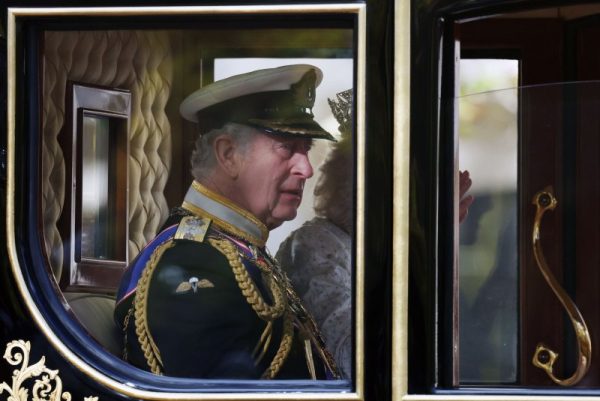King emphasizes law and order policies over pressing domestic concerns

King Charles III outlined the nation’s policy priorities before Parliament on Tuesday, emphasizing a renewed focus on criminal justice laws and expanding clean energy initiatives, but the speech raised immediate questions about support for Britain’s struggling public services industry. Photo by Andy Rain/EPA-EFE
England’s King Charles III outlined the government’s policy priorities before Parliament on Tuesday, emphasizing a renewed focus on criminal justice laws and expanding clean energy initiatives, but the speech raised immediate questions about support for Britain’s struggling public services industry.
Charles, who was crowned in May, paid tribute to his late mother, Queen Elizabeth II, during his first state address at the opening session of Parliament as the monarch, marking the first such appearance by a king in 70 years. Advertisement
The speech emphasized the government’s commitment to making challenging yet necessary “long-term decisions to change this country for the better,” Charles said.
The speech came after widespread labor strikes nearly crippled Britain’s most critical industries earlier this year as public sector employees put pressure on British Prime Minister Rishi Sunak to raise federal wages, which he resisted doing.
Now, months later, campaign season was heating up, with the general election scheduled to take place before January 2025, while the government seemed poised to prioritize law and order over many other pressing domestic concerns.
Notably, there were no legislative proposals to boost public services like health and education, nor was there any plan to bring Sunak’s primary school testing standards to fruition, although there was a proposal included to ban public smoking. Advertisement
The king’s speech highlighted legislation for Britain to join the 11-member Indo-Pacific trade bloc, including Japan and Australia, with anticipated benefits for British exporters in terms of reduced tariffs on food, beverages and vehicles.
In what was likely to be the last parliamentary session before the vote, the government unveiled a legislative slate of 21 bills, including seven that were brought over from the previous session, such as a bill on rental reform and another proposal that would prevent public entities from boycotting Israel.
The tougher stance on crime could highlight the monarchy’s potential rift with the Labor Party, as pending sentencing laws, police powers and the treatment of crime victims were major points of contention with opposition leader Keir Starmer.
The king proposed legislation that aims to block early prison releases for sexual offenders, while suspending sentences for those serving less than a year in jail.
Another measure mentioned by the king grants police the authority to compel defendants to attend sentencing hearings, with a provision to add two years of imprisonment if they decline to appear.
One controversial issue that wasn’t included in the king’s speech was a proposal to ban homeless people from using tents, a notion that unsettled the more conservative members of the national assembly. Advertisement
The king made no reference to a proposed ban on conversion therapy aimed at altering one’s gender identity or sexual orientation.
The government announced an annual system for granting oil and gas licenses to help achieve energy security, but environmental concerns persist regarding ongoing drilling activities.
Housing Secretary Michael Gove plans to advance two long-awaited reform packages, one aimed at expanding renters’ rights in evictions, and the other focused on protecting leaseholders when an owner sells the residence while potentially leaving the current tenant high and dry.